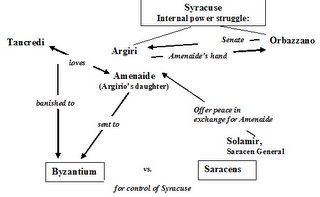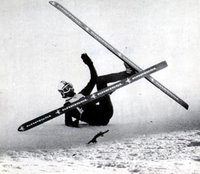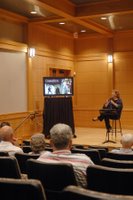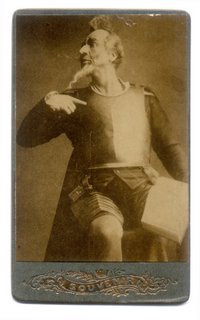"Young" Artists
Fresh from Friday's Discovery Series solo recital by Cliburn Silver Medalist Joyce Yang. It's going to take me weeks to get up the nerve to touch the piano again. Kidding, of course, but this young woman did give us an evening of music to remember. Bach both passionate and transparent, Romantic barn-burners (no pun intended; we don't joke about fire here...) that steered clear of cliché but held little else back, and a performance of Carl Vine's Sonata #1 (1990) that had our audience bickering over who got to purchase the last CD at intermission.
Prodigies
Her level of musical and technical mastery reminded me again how different the playing field is for instrumentalists (particularly pianists and string players) and for singers. Prodigies abound in the pianistic world, and some of them are the real deal - not just highly trained musical robots, but intuitive, deeply expressive musicians. And although I personally think of a 19-year-old as a prodigy, we all know that in the instrumental soloist world, that's a bit of a stretch.
But a 19-year-old singer? Ready to compete, prepared to take on the workhorse repertoire, able to put his or her instrument at the service of the music? Not so much. The reason is obvious and not at all difficult to articulate. Joyce has been playing since she was 4, tackling substantive repertoire for over 10 years. Of course, she has been growing, physically, mentally, and emotionally, but her basic equipment has been, if not constant, at least consistent. A 19-year-old light soprano may have been living with a quasi-predictable instrument for a year or two. A 20-something mezzo, bass, lyric tenor, or full lyric soprano is still waiting to wake up some day and have the same instrument s/he had the day before.
We "get" this, on the surface. But the truth of it is, by the time any performing musician - instrumentalist or singer - is heading through his or her 20's, pushing the envelope of young adulthood, there are bills to be paid, and a living to be made. In order to compete in the "young artist" ranks ("prodigy" isn't a complete metaphor, but it's close in an odd way), difficult decisions have to be made, often in the face of incomplete information.
Life is Not Fair
Many a musically talented teenager with a naturally fluid and pleasing voice has made the decision to get a conservatory degree, only to find out by 25 that the physical development of her instrument has been outpaced by colleagues who didn't even start studying music seriously until graduate school. What do you do when you've invested 6-8 years of preparation, tens of thousands of dollars (if you're lucky), and plenty of sleepless nights, and you learn that in the overall scheme of things, God or nature (depending on your point of view and your level of bitterness) has given you a Wurlitzer instead of a Steinway?
There are many ways to answer that question, and not all of them are negative. A subject for another time.
But conversely, if you are one of those singers who suddenly bursts onto the scene with a breathtaking natural voice and a naturally uncanny ability to take the stage and channel the music of the ages, how in the world do you catch up? Years that should have been spent in the studio - crafting a bullet-proof technique, inhabiting all of those foreign languages, learning what makes Mozart tick - now have to be crammed into months. Or worse yet, condensed to periodic Reader's Digest lessons that teachers and coaches cram down your throat so you can survive your next gig intact. Hoping that colleagues and critics remain indulgent even as you struggle to stay one step ahead of your next assignment.
Why the rush? Well, the fact that singers get started late doesn't mean that there's an extension at the other end. The opposite is true. Those pianists will, in many cases, be playing 50 years later. Depending on your vocal instrument (and on your stamina and other physical issues peculiar to an instrument that's housed deep inside a body), you'll be lucky to get 25 or 30. No wonder opera feels ageist. That's a tough ROI, as the business consultants like to say. (Return On Investment, in case you're wondering. If you didn't know what it was, consider yourself fortunate.)
Didn't mean for this posting to turn harsh. Laying out these facts is tough, but necessary. They don't go away, the sheer math of them. But pretending they don't exist is foolish, dangerous, and destructive. Acknowledging them is powerful. It won't turn a career around, but it could reframe a life. You only get the answers to the questions you ask. So be sure to ask the right questions.
Touchy-Feely Alert
There's a positive side to the equation.
Singers don't have to be forced into a mold at age 4 or 8 or 10 in order to compete.
The world that they inherit is broader and richer than that offered to any other musician. (OK, I'm biased.)
And there are more opportunities to participate in and contribute to our culture and our communities. Instrumentalists who don't decide to tackle the beast on an international or national career level have fewer opportunities to stay active on a regional or local level. Even if you're a singer who doesn't have top tier management and is working a day job to pay the bills, there are still places for you to sing. And too frequently (and I know this to be true for many musicians, although others will violently disagree with me), keeping one's art separate from the check that pays the bills has its advantages. If you go into this as a career, do it with eyes wide open. It's a business, and the fact that the product we peddle has intrinsic power doesn't mean the trappings are any less corrupt.
I can hear the objections and caveats from here. And trust me, I know them well. But I'm finding that one of the seductive aspects of blogging is that since I'm putting in the time to write, I get to make the first move. Hit the comment button at the bottom and vent, if you like.
Coming Soon to a Blog Near You...
Am anxious to comment on a recent posting that ties into my ramblings on live performance and amplification. Was going to do it this weekend, but Joyce's performance sent me in another immediate direction. Will get to it soon.
Also have to spend some time talking about our Telemann decision for the summer re authentic or modern instruments. A440 or A415, etc.
And finally, hoping to make a report soon on my misadventures in and preoccupation with all things Marketing. I'm currently torturing myself with Nobrow : The Culture of Marketing, the Marketing of Culture, High-Pop: Making Culture into Popular Entertainment,
Standing Room Only: Strategies for Marketing the Performing Arts ,
All Marketers Are Liars : The Power of Telling Authentic Stories in a Low-Trust World. Was ready to turn my attention elsewhere, but my colleague Larry Edelson is pushing me further and further into the fray.



 I mentioned a few days ago that one potential response to critical audition feedback is Flooding Therapy. An oversimplified definition: Take whatever frightens you and immerse yourself in it until it loses its power.
I mentioned a few days ago that one potential response to critical audition feedback is Flooding Therapy. An oversimplified definition: Take whatever frightens you and immerse yourself in it until it loses its power.






